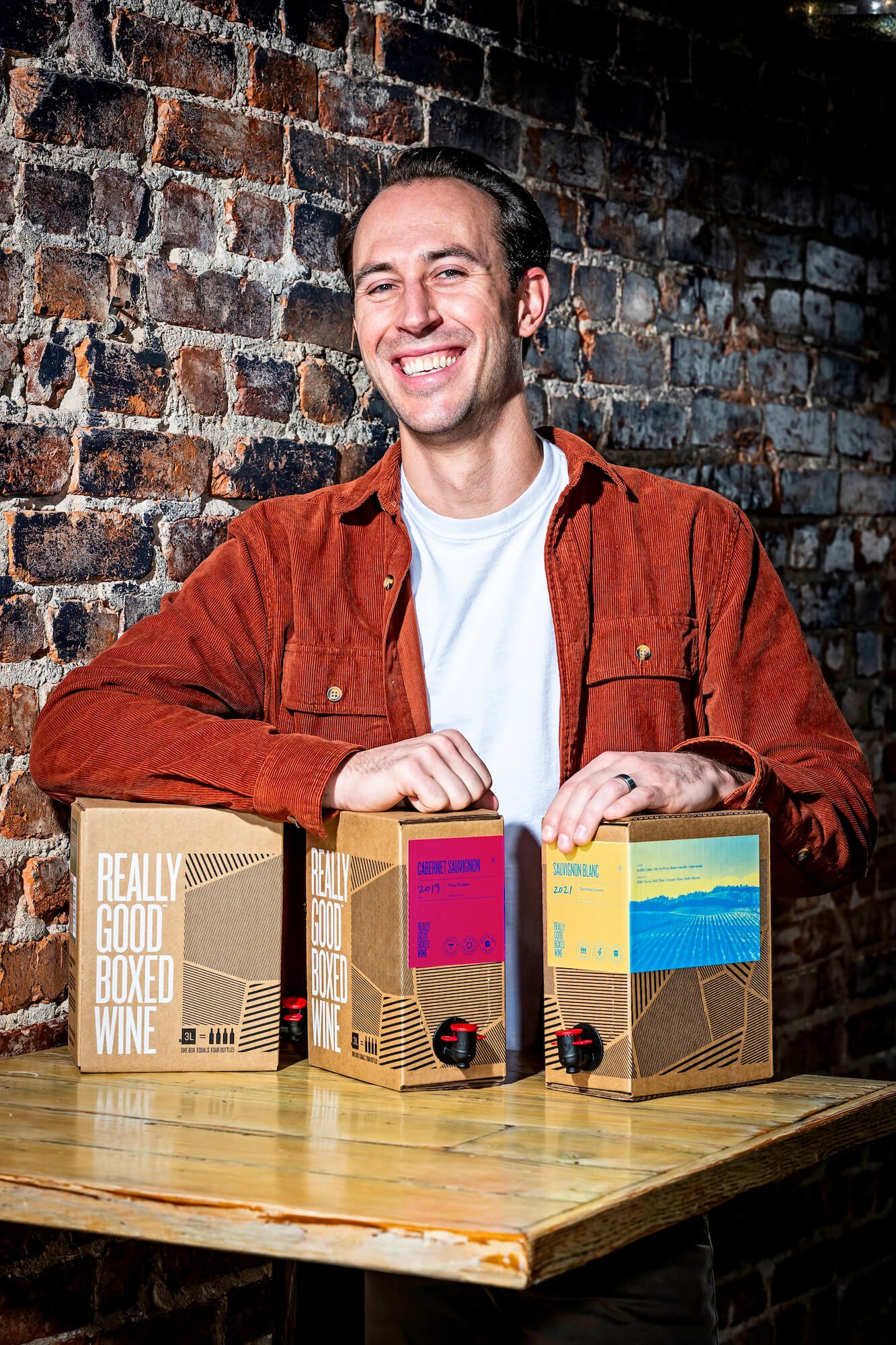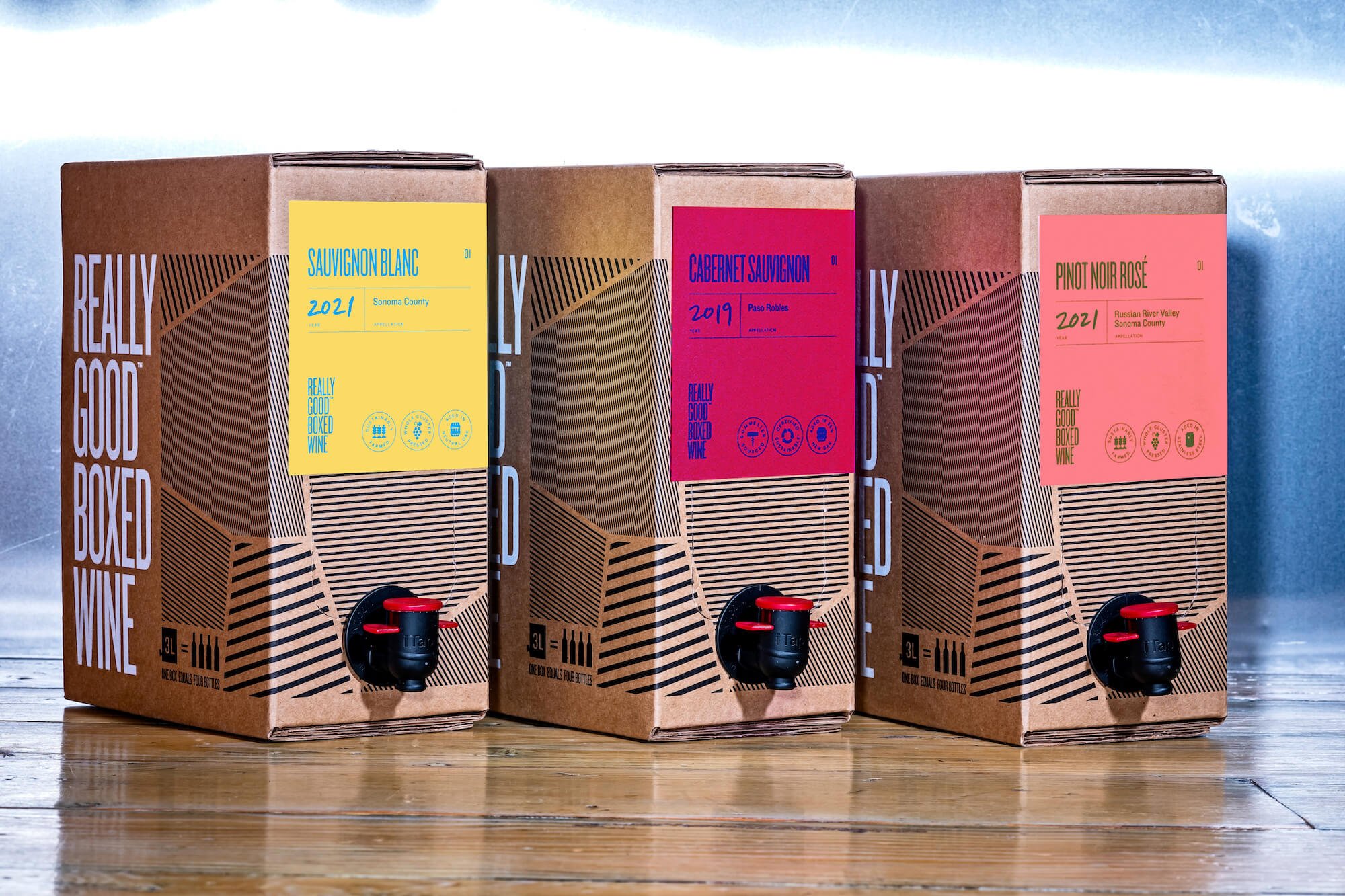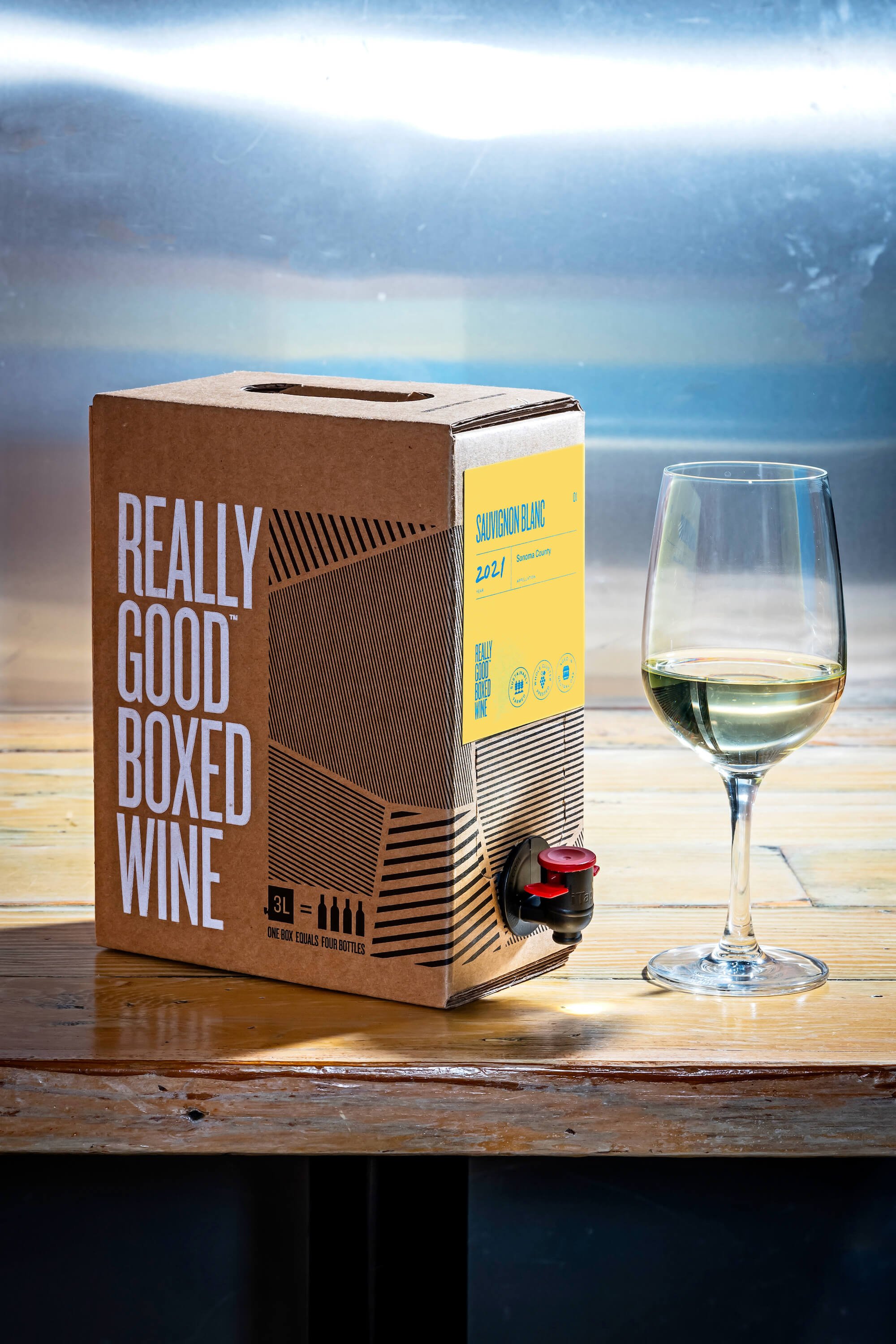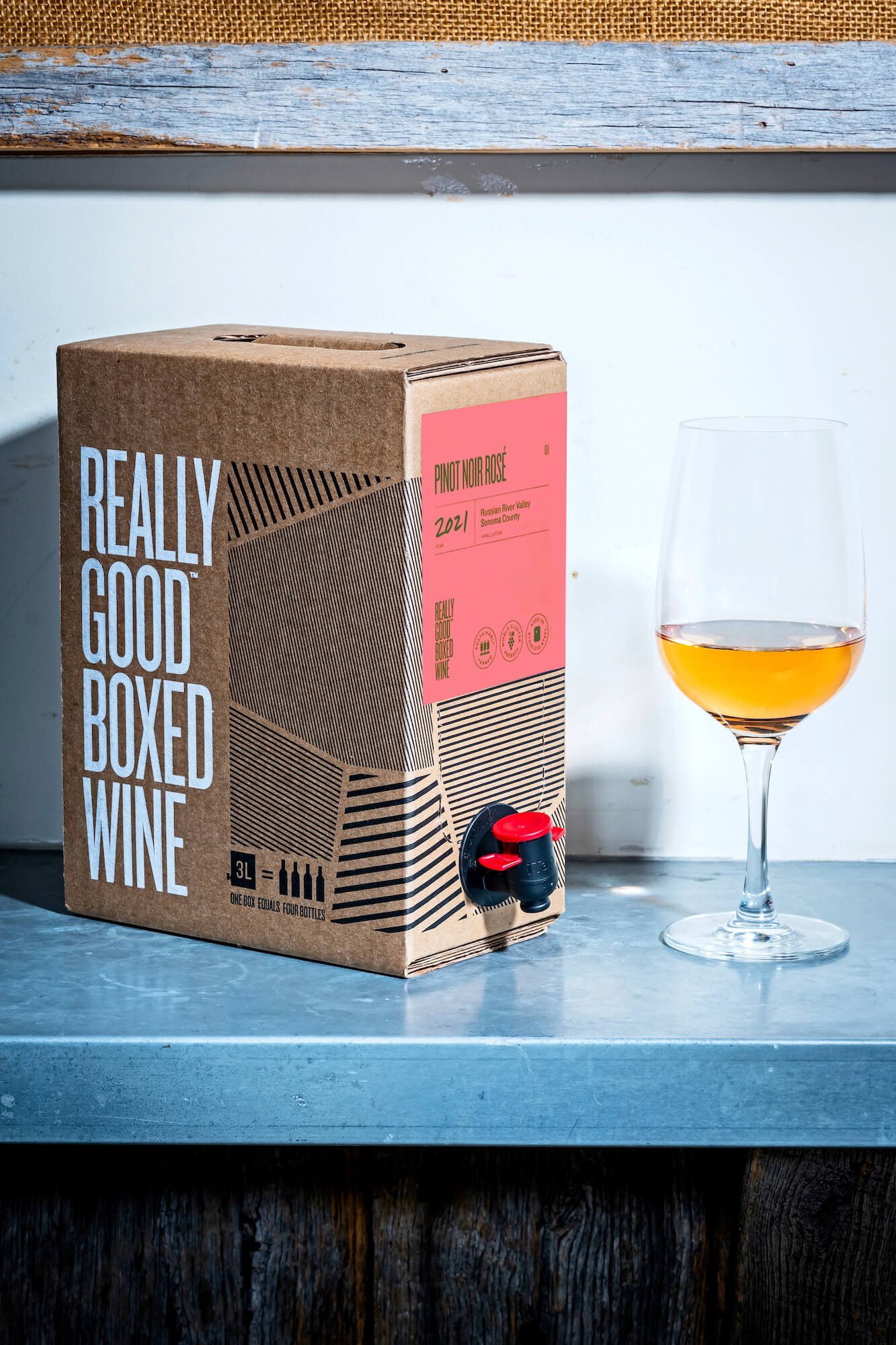Really Good Boxed Wine: Interview with CEO & Founder Jake Whitman
We have to admit, we were intrigued. Is there such a thing as really good boxed wine? The brand Really Good Boxed Wine not only thinks so, but got master sommelier Andy Myers on board with it. If it sounds like something a CPG marketing type came up with, you’d be right. CEO and founder Jake Whitman came from Procter & Gamble but he also built connections in the wine business to get this concept off the ground. We spoke to Whitman to learn more.
Jake Whitman photo courtesy of Really Good Boxed Wine
What inspired you to create this brand?
The idea for Really Good Boxed Wine came as a consumer. I’d always loved the idea of boxed wine, because it solves lots of the problems I ran into with bottles. Boxed wine stays fresh for a long time after opening, so if I just wanted a glass or two, I didn’t have to risk tossing out half a bottle if I didn’t get back to it in time. It’s also so much more cost effective to buy, so if I wanted a lot of wine for any reason, I could save some money. And of course, the environmental part was always on my mind; I hated looking at my recycling bin after a dinner party and seeing piles of heavy glass bottles.
But whenever I bought a box, there was this big glaring problem: the wine wasn’t very good. And that was a dealbreaker for me, so we stopped buying boxed wine.
About a year ago, I was hanging out with my wife, brother, and some friends in a park, and we got on the topic of boxed wine. We started asking that fundamental question: “well...why isn’t there really good boxed wine?” It was something I’d been tossing around in my mind for a while, but I always assumed there was a technical reason why you couldn’t do it.
This time, my interest was piqued enough to dive into researching it, and I went down the rabbit hole. The more I read, the more I realized that it was a cultural problem and a perception issue more than a technical one.
The more I read, the more I started to believe consumers were finally ready. Screw tops and synthetic corks have become more accepted for higher-end wines over the past decade, and canned wines have exploded over the past five years or so. Plus, consumers were becoming more and more aware of the huge environmental impact of bottles. Boxed wine felt like the next frontier that solved some very real consumer problems with wine.
And while I have no professional background in wine, I have worked in 5 restaurants in my life, so I’ve been around guests’ interaction with wine for a long time. And since I started Really Good Boxed Wine, I’ve worked hard to surround myself with amazing people who are super knowledgeable about the wine industry to help grow the brand.
Master Sommelier Andy Myers photo courtesy of Really Good Boxed Wines
How much are you involved in the creation and selection of the wines?
I’m very involved, I taste every wine that we’re considering and taste the wines that we make at several stages. And while I’m not necessarily the trusted palate (I leave that up to our winemaker Tami Collins, Master Sommelier Andy Myers, and one my amazing secret weapons who works very closely with me on the business, Sommelier Amy Troutmiller), I like to think I have a good consumer palate. And ultimately, we want to make these wines for the general consumer who may be wine knowledgeable, but not necessarily a wine expert, so the relatively unsophisticated consumer palate matters a lot as well.
Who do you see as the prime customer for Really Good Boxed Wine? What are they buying now?
There are two separate consumer groups: the first is existing boxed wine buyers who are also buying higher-end wine for more special occasions. They’re buying boxed wine to have that occasional glass during the week, or to serve at a party with a lot of people to save money, but they know that they’re making a tradeoff on quality to get those benefits. We want to show them that for just a little more money, they can get dramatically better wine for those occasions.
The other is people who are currently drinking $20-30 grocery store bottles on a relatively frequent basis, what I call the “popular premium” bottles. We want to educate them on how they can get significantly better wine for less than they’re paying now, rather than having to step up and pay the $30-40+ it takes to get the next tier of wine quality.
Because its large format is it designed to be served at parties? Or just for casual drinkers?
Both! We see people drink our wines relatively split between the two.
It’s a fantastic option to have wine on tap at home, without having to worry about the bottle going bad if you just want to glass or two. One of 3 things happens when someone wants to drink a nice glass of wine, but wants less than a bottle: 1) they feel guilt about putting a half drank bottle of wine in the fridge, because they know it won’t be as good the next time around, 2) they end up overdrinking because they don’t want to put it away, and then feel hungover the next day, or 3) they end up opening a cheaper bottle so they’ll feel less badly about having to toss half of it. High-end boxed wine solves that problem.
It's also a great option for a party, for many reasons. The obvious is that you can get higher quality wine at a 50% or more discount. So instead of shelling out $120+ for 4 nice bottles (or again, buying lower quality wine to save money), you can spend half that for the same great wine. But it also let’s people bring wine to share, and then take it with them when they leave. This is great for things like gatherings in a park, or a barbecue, or other more casual situations when you wouldn’t feel as obligated to leave the wine bottle you brought.
How do you go about sourcing the wine that goes into each release?
Our wines come from a variety of sources. Some of our wines come directly from winemakers and producers through purchase agreements. For any wines we’re sourcing, we build relationships directly with the winemakers and producers rather than go through a bulk wine broker or other path. Some of these have been inbound inquiries about what we’re doing, others are leveraging relationships and making connections to find producers who are making amazing wine, and may have excess.
For our other wines, we purchased grapes and fermented ourselves, as Really Good Boxed Wine is a licensed wine producer in California (CA 02 license). We have a winemaker on retainer, Tami Collins, who both makes wines from the grapes we purchase and works with any wine we’re sourcing from other producers.
Our tasting team consists of Tami Collins (our winemaker), Amy Troutmiller (sommelier and owner of Common Fuel Consulting), Andy Myers (Master Sommelier), and myself. Collectively, we are constantly sampling, and tasting up to 50 wines in preparation for any release.
What wineries have you worked with so far, and which ones are your “dream partners?”
So far, we have worked with the following wineries:
Ketcham Estate: Released a 2020 Pinot Noir last year that we sold out of. We also bought grapes from them for the 2021 harvest that we used to make the Rosé that was just released last month.
A great producer in Paso Robles who wishes to remain anonymous, as they sell a very similar wine for much more.
We bought grapes from two vineyards in Sonoma County for the Sauvignon Blanc that was released this week, one in Dry Creek Valley and one in Alexander Valley. Again, we are keeping those vineyards anonymous
Our next two releases have not yet been announced, but we will be announcing those vineyards once the wines are announced.
The dream is to make a wine with Orin Swift. I just love Dave Phinney’s approach to his brand and his winemaking, and his mantra of never being complacent or restricted by rules and traditions. It fits so well with the journey we’re on to change the perception of boxed wine.
What styles of wine do you think make the most sense to package this way?
First, there are two restrictions: We can’t box sparkling wine we can’t box wine that needs to age in a bottle. However, we definitely can put aged wine in a box, it just has a 12-18 month shelf life.
Beyond that, we want to make wine that’s ready to be consumed immediately after pouring. People are used to pouring wine directly into their glass from a boxed wine, so we try to avoid wines that need to spend a long time opening up in a decanter before drinking. That being said, I do think our Cab really opens up after about 15 minutes in the glass!
Where do you see the most economic advantages to packaging boxed wines?
The economic savings come in two places: the cost of the packaging and the weight for shipping/compact nature of the product. Our packaging costs 80-90% less than the equivalent packaging for 4 bottles of wine, and 1 full box of wine (equivalent of 4 bottles) weighs the same as 2 bottles of wine. We’re able to invest those savings into the quality of the wine, which is how we’re able to offer the wines at such a discount vs. bottles.
Currently your wines are available online individually and by subscription, do you plan to make them available at retail as well? If not, why?
We’re considering it. There’s a ton of opportunity in the DTC wine space -- consumers are demanding it and more infrastructure is being built every year to support it. Avoiding paying distributor fees is the other reason we’re able to offer such a discount. We absolutely won’t sacrifice on quality to sell through distributors, so we would need to find the right path to keeping quality high.
That being said, it’s definitely a limiting factor. We have retailers and wine bars reach out to us all the time asking to carry the wine, so we’re exploring this path and how/when it makes sense to do so.
What will it take to get people to warm up to boxed wine and get over preconceptions that it’s poor quality?
That’s the million-dollar question. That same question was asked 10-15 years ago about screw caps and synthetic corks, it was asked 20 years ago about canned beer vs. bottled beer, and now about canned wine. Those trends changed as people realized either the consumer or the environmental benefits of that packaging, and then producers were willing to put a high-quality product into them. It will take education, but there’s no better education than the surprise you get when you pour a glass of beautiful Russian River Valley Pinot Noir and take the first sip.





